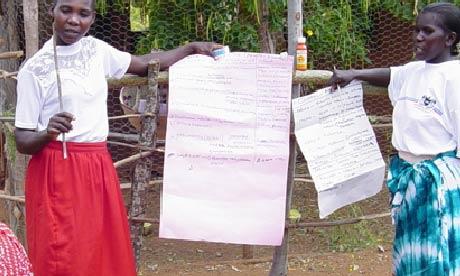Maarifa Centres share community knowledge
FAO's Dimitra project uses participatory communication to improve the visibility of rural populations, especially women. Dimitra's partner in Kenya reports...

Community members share information on how to improve their livelihoods [ALIN]
Access to information and communication technologies (ICTs) is recognized as one way of reducing inequality and poverty. However, ICT penetration remains very low across the rural areas of East Africa.
To remedy this situation, in 2007 the Arid Lands Information Network (ALIN) and its partners began establishing community knowledge centres in arid rural areas of Eastern Africa. The centres are popularly known as Maarifa Centres (maarifa is the Swahili word for knowledge).
At present there are 10 centres – eight in Kenya, one in Tanzania and one in Uganda. Each is equipped with computers and internet access, and a resource centre containing newspapers, journals, books, research reports, CD-ROMS and audiovisual materials on DVD. All the centres are linked through an Open Knowledge Network platform.
At the Maarifa Centres, community members can access and share information on how to improve their livelihoods through new technologies for farming and livestock keeping, and on how to cope with environment and climate change. They also benefit from accessing current marketing information, and information related to health, gender, and HIV and AIDS.
The centres offer basic ICT training to community members, often young people who have graduated from secondary school. The centres also act as information access points for community development workers, who provide agricultural and related extension services in the region. They use the centres to acquire free online development information and to send weekly reports to their ministries or organizations.
The centres are run by Community Information Volunteers, selected and trained by ALIN. They are generally young graduates in communication, information technology, agriculture, environmental studies or community development. The volunteers manage the centre's activities, coordinating the collection of development-oriented local knowledge and experiences and training local communities on the use of ICT tools. This work experience helps them to find a job more easily later.
Of the volunteers recruited, 70% are female. These women volunteers act both as an inspiration to the women members of the local communities and as a challenge to the men on the importance of education and empowerment of the girl child.
The information collected and submitted by community development workers, community members or by the volunteers, is shared through the Open Knowledge Network. To ensure continuity, volunteers work with a local person, who acts as a community representative.
The lack of proper infrastructure such as power supply remains a key challenge to the successful implementation of the project. ALIN uses solar panels that can only power a few computers. Whereas laptops work better in such places, they are considerably more expensive than PCs. In a number of areas, especially among the pastoral communities, uptake of ICTs is slow. Also, cultural factors limit the opportunities for women to access the ICT services.
